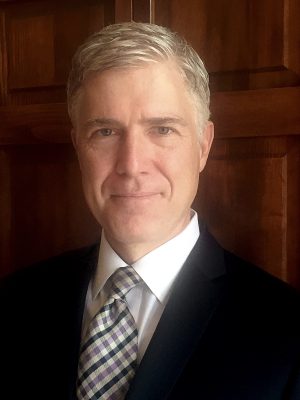
Judge Neil Gorsuch (U.S. Court of Appeals for the Tenth Circuit)
The President has nominated Neil Gorsuch to replace Justice Scalia on the Supreme Court.
There’s a lot there. First, looking at the political process, it’s insane that the Senate refused to even hold a hearing on President Obama’s nominee, Merrick Garland. Garland is immensely qualified and widely well-regarded. The refusal to hold a hearing was a low point for the Republic. Though, on a happy note, the Senate Republicans seemed to do this on their own, without any involvement from Putin. So by the standards of the times, this obscene power grab can almost be seen as an act of patriotism.

Stand With Survivors: Legal Tools To Make A Real Difference This DVAM
Enhance your legal skills to advocate for survivors of intimate partner violence.
But, aside from what it means for whether our country is functioning as the framers intended it would – or is functioning at all – swapping Gorsuch in for Garland appears to be an improvement for people who are accused of crime in federal court. And for the lawyers who represent those people.
It’s worth noting the contributions of the Justice who vacated the seat. Justice Scalia was generally a friend to the citizen who found him or herself accused of a crime. To be sure, there were exceptions, but it was Scalia who wrote Kyllo, vindicating a person’s right to be free from heat imaging of their house. In Scalia’s words, thermal imaging is problematic because it “might disclose, for example, at what hour each night the lady of the house takes her daily sauna and bath.” What a tender way to support the rights of those suspected of committing a crime.
Scalia launched the Crawford revolution, giving meaning to the Sixth Amendment’s right to confront one’s accusers after it had been mushed beyond recognition by a doctrine that focused on reliability instead of cross-examination. If it weren’t for Scalia, the federal sentencing guidelines would likely still be mandatory. If that’s true – if Scalia’s work ended mandatory sentencing guidelines in federal court, the late Justice did more to end mass incarceration than President Obama.
Judge Garland, by contrast, has not built a reputation as a friend of those accused of a crime. The highlight of his career before the bench was as a prosecutor; as a judge, he acted like it. As the New York Times wrote, “[i]n close cases involving criminal law, [Judge Garland] has been far more likely to side with the police and prosecutors over people accused of crimes.”

The Trump Gold Card: A New $1 Million Pathway To A U.S. Green Card
A new proposal would let wealthy foreign nationals secure an opportunity for a U.S. green card with a $1 million 'gift' to the government, sparking legal and ethical debate.
The question may be one of empathy. When a judge hears about how someone is being treated by the government, do you empathize with the prosecutors and cops, or do you empathize with the person who has the massive punitive machinery of the state bearing down upon him or her? As the New York Times quoted Professor Stephen Saltzburg as saying, “I think [Garland] genuinely understands some of the pressures on prosecutors and police that perhaps non-law-enforcement judges may discount.”
Judge Gorsuch, by contrast, is much closer to Scalia. While he could have a stronger record of sticking up for defendants when they raise collateral attacks, he’s been good on the Fourth Amendment.
According to Business Insider, Gorsuch dissented in a case where cops walked onto a person’s property, despite a number of No Trespassing signs in the yard:
Gorsuch mocked the majority’s opinion, saying it gave government agents the right to ‘invade’ a homeowner’s property ‘whatever the homeowner may say or do about it.’ The homeowner ‘might add a wall or a medieval-style moat, too,’ Gorsuch wrote. ‘Maybe razor wire and battlements and mantraps besides. Even that isn’t enough to revoke the state’s right to enter.’
Gorsuch sided with a man accused of a child pornography offense who argued that the National Centers for Missing and Exploited Children had been converted into a government agent.
And, most colorfully, he dissented in a case involving a kid arrested for excessive burping.
There are a lot of reasons to worry about Gorsuch’s nomination. It’s hard to think about how the executive branch will function if Chevron deference is done away with. It feels wrong for the Republicans to be rewarded for obstructing Garland’s nomination. The Court needs another HLS grad less than the world needs another folk singer.
But there are bright points too. And on criminal justice issues, Gorsuch is a better draw for defense lawyers than Garland would have been.
Matt Kaiser is a white-collar defense attorney at KaiserDillon. He’s represented stockbrokers, tax preparers, doctors, drug dealers, and political appointees in federal investigations and indicted cases. His twitter handle is @mattkaiser. His email is [email protected] He’d love to hear from you if you’re inclined to say something nice.